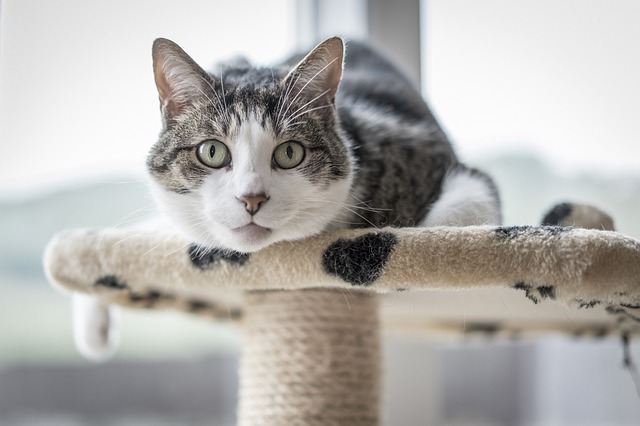Our veterinarians are often asked this question: “Why does my cat urinate outside the litter box?” This is an excellent question to ask us because there are several possible answers, and cat owners have taken the first step in finding the right one by consulting with us!
Generally, a cat will urinate outside the litter box because of an underlying medical issue or a behavioural problem. You cannot ignore this behaviour in the hope that it will go away by itself. If your cat is peeing all over the house, it’s frustrating for you as an owner because the odor is very strong, requires constant and thorough cleaning, and can damage the floors and baseboards in your home.
Cats are normally very attentive to being clean, so this unusual problem is a definite sign that something is wrong. Our veterinarians can rule out a possible medical issue and can treat your cat’s problem if one is discovered upon closer examination.
Medical Issues That Cause Cats to Pee Outside the Litter Box
There are a number of bladder and urinary tract problems in cats that a veterinarian can discover and treat successfully. Normally this will solve the dilemma of a cat urinating outside the litter box. Your cat’s vet will usually ask to examine a sample of your cat’s urine and conduct a physical check-up. During the check-up they will feel various parts of the cat’s body to see if there are lumps or bumps where there shouldn’t be, or if your cat reacts with pain when they’re touched somewhere.
These are some of the most common medical problems that cats experience in regards to peeing outside of their litter box:
- Urinary Tract Infection (UTI). Bacteria in the urine means there is an infection or inflammation in the urinary tract, and your veterinarian will prescribe an antibiotic. Your cat will probably need a follow-up examination to make sure the infection is completely gone.
- Bladder Stones. There may be stones in the bladder that can cause pain or blockage. If your veterinarian suspects stones, a radiograph will be used to determine how many and how large they are. Sometimes they can be dissolved with a special diet, but if the stones are large, surgery may be required and possibly an antibiotic, too.
- Crystalluria. Crystals will form in the urine if the pH (acidic level) of your cat’s urine is too high or too low, and crystals will irritate the urinary tract. Treatment usually means a special diet and possibly anti-inflammatory medication or antibiotics as well.
- Idiopathic Cystitis. This is the name for bladder inflammation when the cause is unknown and blood in the urine is detected. If there are no bacteria, no crystals, and no stones, the problem will be diagnosed as idiopathic cystitis.
- Feline Lower Urinary Tract Disease (FLUTD). This is the name for any urinary tract disease that has become chronic. Both FLUTD and idiopathic cystitis are treated with a special diet and sometimes additional supplements to strengthen the cat’s urinary tract.
- Other Medical Issues. If your cat is obviously trying to pee but can’t, or only a small amount of urine is expelled, immediately take your kitty to your family cat clinic. There could be an obstruction or blockage, which is a dangerous situation for your pet.
If no bladder or urinary tract problems are discovered, your pet may be experiencing pain or discomfort from some other parts of the body. More lab work is needed to check for serious problems such as diabetes or kidney disease and treatment should be started as soon as possible.
Behavioural Issues that Cause Cats to Pee Outside of the Litter Box
If medical problems have been ruled out, behavioural issues must be considered.
- Litter Box Problems – Your cat may be unhappy with the litter box for one or more of the following reasons:
- The box may be too dirty too often. Litter boxes should be scooped out once and sometimes twice a day depending on how many cats live in the home. The litter should be replaced and the box washed every month.
- The box may be clean enough but not comfortable enough if the box is too small or too deep for your cat. You could try introducing a large plastic storage box (the kind used for storing items under the bed), especially if your cat is big and fluffy, or you can try a large disposable box that can be thrown out as the odor accumulates, such as once a month.
- Your cat may be unhappy if the box is covered. Some cats feel cramped or uncomfortable inside a covered box. Take the cover off and see if that solves the problem.
- Kitty may not like the litter—the odor or the feel. Try a new litter that’s unscented and easy to scoop out.
- Several cats using the same litter box can create problems, especially if one of the cats is a bully and insists on hogging the box. Also, if a new kitten is introduced into the home and uses the same litter box, the risk of parasitic diseases such as tapeworms becomes more likely to spread to your healthy, older cat. Other times, some cats don’t like the odor of the urine or feces of other cats, or are too timid to use the box if another cat is in the way or has just finished using the box. The solution is to have more than one litter box, preferably in different locations. If you do have a new kitten, get them vaccinated and treated for worms and then provide them with a designated, separate litter box at home.
- Cats prefer a quiet and private location and one that is away from where they eat. Placing the box behind a door or behind a screen is a good idea.
- Stress – If a cat is anxious, stressed, or particularly timid, especially if other animals live in the house, your kitty may prefer to choose a “safer” place to go, which is away from the other animals. Provide your stressed cat with a litter box in a different location. Make sure it is not beside noisy machinery like a clothes dryer.
If there are cats gathering outside the house regularly, your cat may pee near the door as a way of marking their territory. Move a litter box by the door until you can discourage the outdoor cats from coming around.
Cats are creatures of habit, which means they may react to any major change in the environment—new people, new pets, or frequent noisy visitors. Cats may begin to pee in different locations because the smell of their own urine makes them feel safer if there have been changes in the household. Make sure your cat has a safe place to go, high or hidden, with a couple of treats to help with adjustment. There is also medication available if your veterinarian thinks it is a good temporary solution.
- Aging, Disabled, and Ill Cats – As cats age they may develop arthritis, which can make it increasingly difficult for them to climb in and out of their litter box. A cat with an injury may incur a permanent disability and no longer be able to perform the usual jumping and running activities that are easy for healthy cats to do. Also, if your cat is recovering from an illness, it may be temporarily difficult for your kitty to use the litter box in its current area.
For an ill or injured cat, make it easier to access their litter box by moving it closer or providing a ramp until your cat is back to normal so that accidents don’t occur.
If your cat is arthritic or has a physical disability, provide one or two new litter boxes so that there is one on each floor with permanent ramps.
Remember that old urine smells can attract a cat back to an area where he or she once urinated. If your cat has peed outside the box for medical or behavioural reasons, solving the problem itself may not be enough. Make sure you thoroughly clean and scrub away all traces of urine in any location outside the litter box, or your cat may start to think some other spot is an acceptable alternative to use.
There are many possible answers to the question of why your cat has started peeing outside the litter box and it is one of the most frequent problems for cats, even those who have had spotless records at the cat clinic for many years. To find out what to do, schedule a check-up for your cat. Meanwhile, make sure you are providing them with a happy environment and a clean and easy-to-access litter box—or boxes—designed to make your cat feel comfortable and safe.
Creative Commons Attribution: Permission is granted to repost this article in its entirety with credit to Hastings Veterinary Hospital and a clickable link back to this page.






